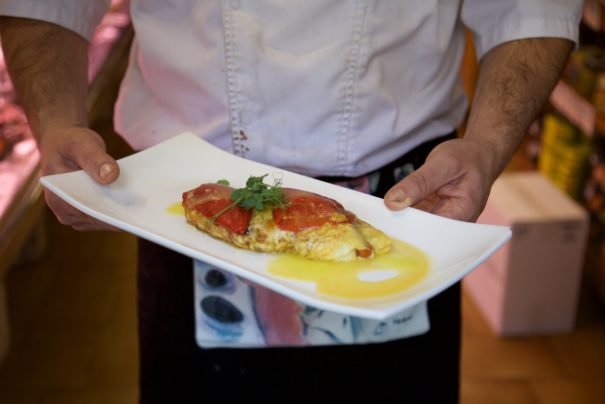
Breakfast Like a King, Lunch Like a Prince, Eat Dinner Like a Beggar

Breakfast Like a King, Lunch Like a Prince, Eat Dinner Like a Beggar
Tortillas in Barcelona
Breakfast, lamented Josep Pla, Catalunya’s greatest culinary writer, was usually escarransits—puny. “Here, in general, one breakfasts with a cup of black coffee or a coffee with milk and a toast.” He was specifically referring to the region’s larger towns and cities, including Barcelona, where I live.
Pla contrasted these inadequate repasts with another sort that consisted of more than a quick hit of caffeine and calories, the kind he called esmorzar de forquilla, breakfast with a fork: grilled fresh sausages and white beans, pigs’ feet with turnips, or one of the many stews—rabbit with snails, pork knuckle with wild mushrooms—slow-cooked in a terracotta cassola. Alongside came oblong slices of toasted country bread rubbed with tomato and drenched in olive oil and a porró of rough wine from the local cooperative. If there was coffee it arrived as a finale with a shot of brandy or rum in it.
The tradition of such hearty fare comes from Catalunya’s rural interior, but also around markets. Country folk would come in from their farmsteads early, finish the brunt of their business by 9:00 or 10:00 am, and be ready for a substantial meal.
My own days begin as early (but certainly less strenuously) as a farmer’s, and after a couple of hours at my desk, I am ready for breakfast.
Today is one of those mornings when the body, not to mention the soul, craves more nourishment than a croissant or even toast slathered in marmalade could offer, and I head to Can Ravell, one of Barcelona’s old-school spots that continue to satisfy such fortifying, late-morning cravings.
Opened in 1929 and still run by the founder’s son, Josep Ravell, this slender neighborhood deli-cum-restaurant sits beside one of the city’s fine covered food markets, the art nouveau Mercat de La Concepció.
Through the heavy door, I pass high shelves jammed with tins of bonito del norte tuna, mussels in escabeche marinade, smoked paprika, cured legs of jamón ibérico dangling from the ceiling, and a curving glass case crowded with wedges of aged Manchego, Cabrales cured in dank mountain caves, and dozens of other cheeses.
I take a seat at one of the two long, marble tables in the back room lined with wines and spirits.
Josep ambles over, and, after chatting about Pla for a moment, offers some breakfast suggestions. I skip my favorites—cua de vaca (oxtail stew slow-cooked all night) and Can Ravell’s legendary cannelons (stuffed cannelloni)—and opt for a salt-cod egg tortilla.
The season’s first pressing of arbequina olive oil has just arrived, and Josep brings a bottle of it along with some bread. Unfiltered, sprightly yellowish-green, and more muddy than simply opaque, the oil exudes the vibrant and fruity flavors of the field, not the factory.
The has been replenished by time the chef carries out the tortilla on a long, rectangular plate. A wrap of whisked egg envelopes tender hunks of cod and garlic confit. On top sits a pair of fire-roasted and hand-peeled piquillo red peppers. Juices are already pooling along the plate. I take a hunk of bread and mop these up before cutting into the tortilla itself.
“Esmorzar com un rei, dinar com un príncep i sopar com un captaire,” goes a popular Catalan refrain. “Breakfast like a king, lunch like a prince, and eat dinner like a beggar.”
With a solid start to that equation, I pass through La Concepció market on my way home and pick up the makings of a prince’s lunch and a beggar’s dinner.
In the meantime, though, back to my desk.